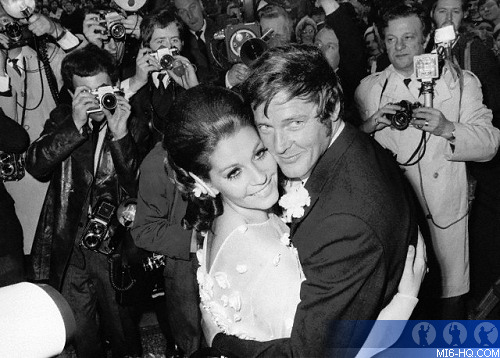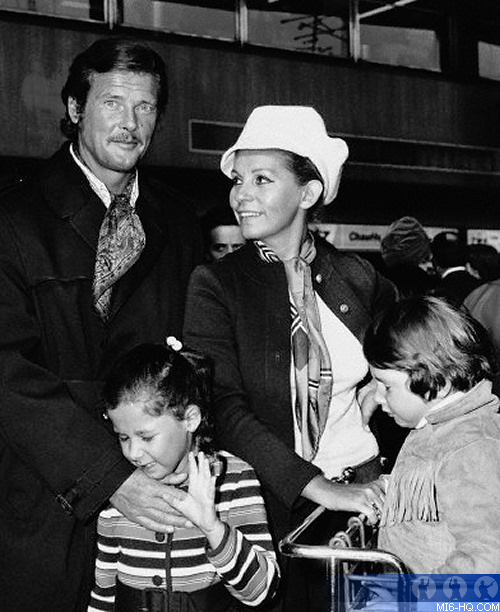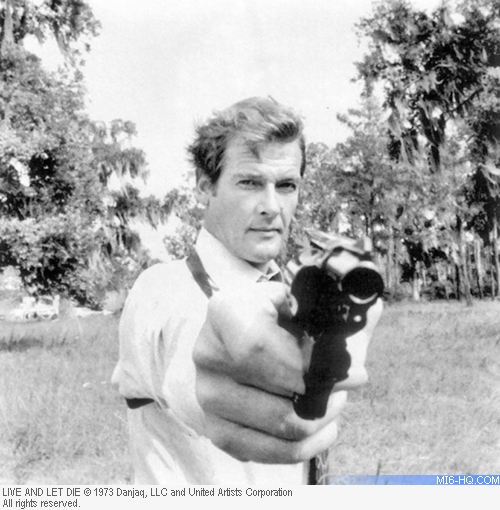For a syndicated feature that headlined Sunday newspaper magazine
supplements across the United States on July 1st, 1973, Roger
Moore and his then wife Luisa talked about their lives and his
rise to fame as the new 007.
Roger Moore and His Wife - He's the New James Bond
Will Roger
Moore follow in the money-minting footsteps of Sean Connery,
or in the slough of George Lazenby? That's the $7.5
million question United Artists is asking, because that's how
much "Live And Let Die" cost to produce. Saltzman and
Broccoli are so sure that More is "right" for James
Bond that they have signed him for two additional Bond pictures.
"I think," Roger Moore says, "that I've got an
even-money chance to make it. After all, I've been around a long
time in this business. I did 'The Saint' and TV for seven years
then 'The Persuaders' on TV with Tony Curtis. And as a matter
of fact, Cubby and Harry tell me that when they first started
making the Bonders, I was their first choice for the role. I
don't believe them, of course. But that's what they say."
Roger Moore is possibly the est-liked English
actor in films today. He is alight-haired, blue-eyed, easygoing,
down-to-earth
man who has a kind word for everyone, even his two ex-wives.
His current wife, the former Luisa Mattioli, an Italian actress,
with home he lived for eight years and had two children before
they could marry, describes him in her lilting Italian accents
as "the most comfortable man, and actor - yes, but also
a normal man, very calm, very good, reliable when the water gets
rough."
The history of their relationship is by now
well known here, which is why Luisa doesn't mind disclosing it.

Above: Roger Moore and his wife,
Italian actress Luisa Mattioli, leaving Caxton Hall
after their wedding ceremony.
|
"I met Roger," she explains, "in 1961 when we
were filming together in Rome and Yugoslavia. It was after his
Hollywood period - he had been unhappily under contract to MGM
- and quite simply, we fell in love. He told his wife, Dorothy
Squires, a very popular singer here, and like a decent, respectable
man, he asked for a divorce. His wife said no. For eight years,
this woman, this Dorothy Squires, would not divorce Roger. She
is many years older than he is. She though
his love for me was infatuation, that it would pass. And, of
course, she was jealous. And I could understand that."
"She practiced - how you call it? - self-delusion. Even
after out children were born, even after Roger and I set up house,
she still would not divorce. It was very difficult for us. You
can imagine. Difficult for me, for my family in Italy, for the
children. And, of course, for Roger. No interviews. Nothing about
his private life. No pictures of me, the children. Lies, whispers,
gossips."
"I was living somewhere between heaven and hell, always
under a cloud. After five, six years, I tell you the truth. 'She
will never give you a divorce' I tell Roger. But he says, 'Don't
give up hoping.' Then one day, November, 1968, Dorothy Squires
- I never see her. We have never met. I see only her photo. One
day she charges Roger with desertion, and she gets the divorce."
"I could not believe it. I think now it was because of
her friends. They told her she was being silly, mean, revenge.
What for? Roger was not coming back to her. Never. I think she
realized that. Finally, Roger and I free to marry. Ho do you
like that? After eight years living together and two children,
free to marry. How do you like that? By then we were in no hurry.
We wait until April, 1969. Then we marry in London. Now I am
pregnant, for the first time in marriage. And it is, I must say,
a relief. Because Roger and I are old-fashioned."
"Always we believed in marriage. I remember how I used
to argue with my parents. You know how Italians are. If you compromise
their daughter without marriage, they are ready to kill. I convinced
my family not to harm Roger. I told them, 'He will marry me
one day. Be patient.' I am sorry my father is not alive. He had
a hotel in Genoa. He would enjoy our happiness and, yes, our
luck."
"And we are lucky. We have this big, beautiful house, nine,
ten bedrooms in Denham, 17 acres of land. And out two beautiful
children, and another one on the way. And there is Roger's career.
The new James Bond. I am sure he will be a success. He is a very
professional actor. Everyone, everyone likes him, because he
likes everyone. That is his secret. The good heart. No vinegar
in his nature."

Above: Roger with his wife Luisa
and their children Deborah and Geoffrey in 1971.
|
One reason Roger Moore is so well liked both in and out of the
film business, is that he is basically and unpretentious man
who refuses to take himself seriously, a welcome contrast to
most actors.
"I'm really a lucky bloke," he admits, "who was
born with a photogenic face and got a few lucky breaks. There
was never any acting tradition in my family. My father, as you
probably know, was a policeman here, and since I was his only
child, we developed a really warm friendship. I grew up in South
London, and despite the war I had a happy youth. My family never
had much money, and I went to work after I left school for a
company called Publicity Picture Productions, which specialized
in animated cartoons."
"I started in as an apprentice cartoonist and was promptly
fired, which in retrospect was one of those lucky breaks I mentioned."
Out of work, Moore was tipped by a friend that he might pick
up a few pounds working as an extra in a film, "Caesar and
Cleopatra", then shooting in Denham.
"I worked as an extra for a few days," he recalls, "and
on the third days as I walked through the gates, a car pulled
up alongside me. The co-director on the film was a man named
Brian Desmond Hurst. He stuck his head out of the window, called
me over, and asked if I was interested in becoming an actor.
I said, 'Sure." Hurst told me that if I could get my family
to support me for a while he would pay my tuition at the Royal
Academy of Dramatic Arts. It sounds like a film script, doesn't
it, but that's the truth of how I became an actor."

Above: Roger on location for
his first 007 adventure "Live And Let Die".
|
At drama school, Roger, because he was tall,
handsome, and cheerful, attracted many girls, particularly a
beautiful blonde named Doorn
Van Steyn. When Moore was 18 he was called into the Army, commissioned
a second lieutenant and shipped to a supply depot in postwar
Germany. Two months after he reached 19, he applied for leave
and married Doorn. They honeymooned in Germany where Moore remained
on duty until he was almost 21. Discharged from the service,
he returned to London to resume his acting career. But there
were precious few jobs - at least for him.
"We lived with Doorn's sister in SOuthwest
London," he
narrates. "I worked as a dishwasher, a waiter, a male model.
I did odd jobs in radio and TV. I even peddled novelties on Oxford
Street. It was a rough five years, and gradually our marriage
came apart. We were very young; we had very little money, very
many bills, very many hardships. And we just fell out of love."
At a party in 1953 when Moore was almost 26
he met Dorothy Squires, then a big-name singer of 35, in London.
They were mutually attracted,
and before the year was out, Moore's wife was granted a divorce
on grounds of adultery with Dorothy. That same year, however,
Roger was screentested by MGM, signed to a screen contract starting
at $250 a week and shipped off
to Hollywood where his first film was "The Last Time I Saw
Paris" with Elizabeth Taylor and Van Johnson. He also found
time to marry Dorothy Squires in New Jersey and bring her out
to Hollywood where they set up home.
Despite their age differential, Dorothy's subsequent
four miscarriages, and Moore's inability to reach stardom at
MGM, the marriage endured
for eight years. Then Roger, convinced that he was being typecast
in a series of MGM flops, became depressed, asked for his release
and returned to Europe. In Rome to make "The Rape of the
Sabines",
he found that his co-star was Italian actress Luisa Mattioli. "As
corny as it sounds," he says, "I think I fell in love
with her at first sight. When Dorothy refused to give me a divorce,
Luisa and I decided to live together."
As for Dorothy Squires, she once explained her reluctance to
divorces Moore in these words: "I know I must have appeared
stonyhearted in refusing so long to divorce him. But I had a
big, big heartache I was carrying around with me. I was stubbornly
determined that the woman who had taken Roger from me would never,
never become his wife. But I guess time heals all wounds, and
the bitterness fades with the years."
'I never expected Roger to be completely faithful. As handsome
as he was the girls were always chasing him. BUt I simply blocked
those thoughts from my mind. What one doesn't know doesn't hurt
one. But I'm no longer hurt or bitter or filled with recrimination.
I wish him the best of luck."
Roger Moore spent most of the 1960's starring in a TV series,
'The Saint'. "I devoted seven years of my life to it," he
says, "and is was sold in 80 countries and is still being
shown."
The series made Moore a millionaire, and he no longer needs
to work if he doesn't want to. Last year, however, when producers
Saltzman and Broccoli approached him with a multimillion-dollar
offer to star in the next three James Bond thrillers, he couldn't
refuse.
"It's not the money," he says, with a broad grin. "It's
just that I've been wanting a role like this for the past 28
years."